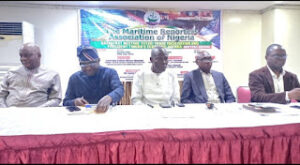
Joyce Mmereole Okoli
The Maritime Reporters Association of Nigeria (MARAN) hosted its third quarter Breakfast Meeting on Wednesday 24th July 2024 in Lagos. The meeting emphasized on the need for efficient planning, true declaration, and adherence to international trade rules and regulations. The event, themed “Trade Facilitation and Tinubu’s Economic Agenda,” emphasized the importance of efficient planning, true declarations, and adherence to international trade rules.
The meeting saw attendance from notable figures including Comrade Fadipe Moses Olayemi, Dr. Muda Yusuf, Mr. Lucky Eyis Amiwero, and representatives from the Nigerian Shippers’ Council, NAGAFF, Ports Police, NDLEA, DSS, and the Barge Operators Association of Nigeria (BOAN).
Stakeholders at the event underscored Nigeria’s potential to become a leading economic giant, highlighting the need for a Marine Economy Blueprint.
Barrister Pius Ukeyima Akutah, Executive Secretary/CEO of the Nigerian Shippers’ Council, praised the digitalization of port processes, stating that over 90% of operations are now automated, reducing human interaction and its negative attributes.
“We are happy to report that over ninety (90%) of port processes and Operations are now automated reducing considerably human interactions and all its negative attributes.
He also noted the operational status of inland dry ports in Kano, Katsina, and Kaduna, which are designated as ports of origin and final destination for cargo.
Akutah emphasized ongoing efforts to complete and commission legacy inland dry port projects and develop Vehicle Transit Areas (VTAs) to enhance cargo safety. Additionally, he mentioned the establishment of Border Information Centres (BICs) at key border posts, in collaboration with USAID and Borderless Alliance, to facilitate trade and gather data for policymaking.
“The President’s directives that immediate steps be taken to complete and commission the remaining legacy IDP projects are pursued with vigor. Similarly, efforts are being geared to the development of Vehicle Transit Areas (VTAs) across the country to facilitate the safety and security of cargo in transit. The Nigerian Shippers’ Council is intensifying efforts to ameliorate the challenges faced by cross border traders at land border posts by the establishment of Border Information Centres (BICs).
MARAN President, Mr. Godfrey Bivbiere, expressed concerns over Nigeria’s port efficiency compared to neighboring countries like Togo. He noted that inefficiencies in Nigerian ports lead to cargo diversion to more efficient neighboring ports, resulting in smuggling issues.
“MARAN is concerned that while Nigeria boasts of a very large port system with huge import inflow, a sizable chunk of this cargo is diverted to neighbouring ports owing to their efficient services; while the same cargo finds its way back to Nigeria, often via smuggling.
Bivbiere also addressed the potential disruptions caused by President Tinubu’s economic policies, advising a balanced approach to revamp the national revenue system and reduce administrative overhead costs.
“A balancing must be sought, especially in view of the fact that the nation export base is still very weak, making us largely import dependent.
He emphasized the need for improved governance, reduced wastages, and a focus on policy stability to benefit consumers.
Dr. Alban Igwe, President of the Importers Association of Nigeria (IMAN), highlighted the importance of trade facilitation in Nigeria’s economic recovery. He stressed the need for simplification, standardization, and harmonization of trade procedures to reduce costs and improve efficiency.
“Trade facilitation is a strategic issue for Nigeria and very apt for an economy seeking recovery, adding trade facilitation solutions is worthy of occupying our breakfast table especially every maritime stakeholder.
“For the avoidance of doubt, Trade facilitation refers to the simplification, standardization and harmonization of procedures and associated information flows required to move goods from seller to buyer and to make payment. It is built on four strategic pillars such as Transparency, Information and advice need to be available for all who participate in trade, Simplification, harmonization and Standardization.
“The main objective of trade facilitation has traditionally been that of reducing the complexities and costs associated with cumbersome border procedures and controls, while maintaining efficient compliance controls. Measures to actively facilitate trade are increasingly seen as essential in assisting developing countries expand trade and benefit from globalization,” he said.
He expressed IMAN’s commitment to collaborating with MARAN to continuously evaluate and improve Nigeria’s trade facilitation policies, aiming to enhance the country’s trade competitiveness on the global stage.

